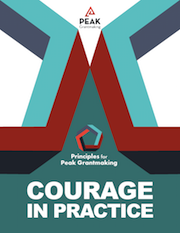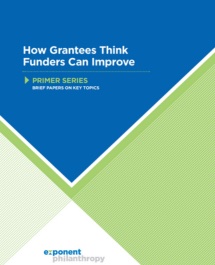Site Search
- resource provided by the Forum Network Knowledgebase.
Search Tip: Search with " " to find exact matches.
How can funders reduce the burden on grantees when requesting demographic data? What information are funders collecting from their nonprofit partners, and what information is needed to make informed decisions and build trusting relationships?
Funders are increasingly requesting demographic data from nonprofits to better understand the types of organizations and leaders that they are—and are not—supporting. Due to the lack of comprehensive and public demographic data available, nonprofits experience a heavy burden to provide the information in a variety of ways and formats.
Join this webinar to learn how to reduce the administrative work for grantees throughout the due diligence and grantmaking processes and beyond. We’ll explore tools that can help streamline the process of collecting, evaluating, and sharing information for mutual benefit.
Cost: This event is free for CNJG Members who are family foundations.
Other types of foundations are ineligible to join this webinar.
This program is a CNJG membership benefit for family foundation members, including staff and trustees, in partnership with the National Center for Family Philanthropy.
How can being more transparent about your philanthropy strengthen your relationships and build trust with grantees and partners?
The annual Trust in Nonprofits and Philanthropy Report showed that 57 percent of Americans trust the nonprofit sector—much higher than the government, media, or the business sector. Yet, only 33 percent have trust in the philanthropic sector (primarily private foundations and high net-worth individuals). Why is this and how can family philanthropy increase this trust?
By prioritizing transparency, families can grow trusting relationships with the communities and organizations that they support, be more accountable donors, and ultimately enhance the effectiveness of their philanthropic efforts.
Cost: This event is free for CNJG Members who are family foundations.
Other types of foundations are ineligible to join this webinar.
This program is a CNJG membership benefit for family foundation members, including staff and trustees, in partnership with the National Center for Family Philanthropy.

Many in our sector are talking about big ideas such as equity and inclusion, narrowing the power gap in our sector, being authentically engaged in our communities, listening and learning from our partners, and living our values in our practice.
We can help the sector move beyond conversation to action.
We believe our members have the power to bring tangible, real-life, and practical implementation to these big ideas to build a bridge between strategic vision and action. To this end, we support their professional growth through developing the competencies that will help them lead this change.
The Manager of Research Operations (MRO), Policy Solutions, facilitates the smooth operation and financial success of the Policy Solutions Department. The department has 12 staff members in a variety of technical and managerial roles. This position requires a high degree of attention to detail, a strong sense of accountability, and a proactive orientation. The MRO is the primary departmental liaison with the Finance and Operations departments regarding contracts & invoicing and provides information & materials to the Communications & Marketing team as needed. The MRO monitors the department’s project pipeline and is responsible for the compilation and submission of complex project proposals.

Under-resourced communities are going without because nonprofits can't meet demand. Americans —particularly those in low-income communities—are still struggling to secure jobs, affordable housing, and healthcare. Nonprofit Finance Fund’s 2015 State of the Nonprofit Sector Survey focuses on the underlying causes of these dynamics by exploring the programmatic, financial, and operational issues facing nonprofits across the U.S.
NFF launched the Survey in 2008, when economic crisis threatened the viability of many organizations. Seven years later, results from 5,451 respondents show some indications of recovery, stabilization, and growth. Nonprofits are adding jobs, engaging in strategic conversations such as leadership succession planning, and looking to retain their workforce. Yet as they raise their sights from the focus on short-term crisis, many are confronting the troubling reality that current practices cannot sustain organizations in the long-term or meet the needs of the communities they serve now. Many organizations have stumbled out of crisis looking to make the necessary investments to secure their long-term future. And it is a hard road ahead.
Eastside High School in Paterson sits in the middle of a struggling neighborhood, in a city where 25% of the residents are living below the poverty line, according to the 2020 U.S. Census.
Paterson’s poverty rate is more than twice the state average of 10%, which makes the school, built in 1926, a refuge — and now a resource.
On Thursday, Montclair State University president Jonathan Koppell came to Eastside with a $1 million grant and a vision: to make the school into a community hub, offering free meals, health care, and mental health counseling, not just to the 2,000 students, but to their families as well.
The initiative is called One Square Mile, and it is being seeded with a $1 million grant from the Geraldine R. Dodge Foundation. The program was developed by Koppell during his tenure as Dean of the Watts College of Public Service and Community Solutions at Arizona State University, which worked with the Phoenix-area community of Maryvale to address poverty.
This piece captures five key insights to guide organizations as they develop ongoing Measurement, Learning, and Evaluation plans to achieve greater social impact:
- Theory of Change amplifies your impact—helping you focus on the linkages between, and assumptions underlying, your strategies and outcomes.
- Progress toward long-term goals is observable in interim measures.
- Setting targets along the way forecasts your trajectory and provides feedback that tells you if you’re moving in the right direction.
- Impactful measurement needs to align with the rhythm of your work and provide the right data at the right times.
- The payoff of measurement is in the practice, and putting that practice to use greatly increases your odds of success.
When confronted with measurement and evaluation, some turn first to the expensive and time-consuming practice of “gold standard” experimental designs requiring comparison groups to definitively prove whether an intervention delivers the expected results. While measurements of this type are reasonable in certain situations, they are often a stretch for the real world of social innovation and are limited in their timeliness, strategic value, cultural applicability, and validity for measuring the changes sought.
You can get more for less—by deploying measurement based on social science rigor and valuing adaptability and learning. In other words, social innovation is best measured in real time and in ways that can be seamlessly woven into the rhythm of the business cycle and the daily practices of those responsible for funding, managing, and implementing social change.
